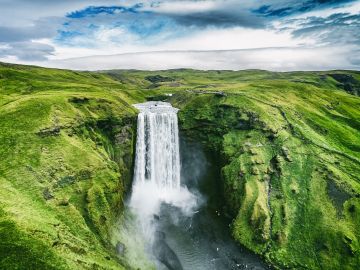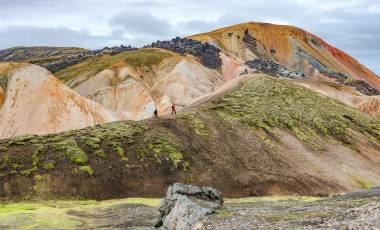Our guide and group completed this awesome-inspiring adventure with joy, satisfaction and with memories that will last a lifetime.

Iceland Walking Holidays
Iceland Walking Holidays
Leonardo Lerma Tour du Mont Blanc Week
Karen Berry Tour du Mont Blanc Camping TrekThis was a challenging trip, but well paced. Every long climb was rewarded with spectacular views, and often a cake at a refuge. It was great to be part of a large, friendly group – everyone helped each other out with the camp pack down in the mornings, and encouraged each other along the way. The satisfaction of completing the circuit, and being able to look back at the mountain passes we’d covered was huge.
Rodney Hall Tour du Mont Blanc WeekA great week walking in the Alps, magnificent views, changing terrain, good company and food, pleasant accommodation and a very competent leader
Top 5 Natural Sights to See on Iceland Walking Tours
Alftavatn Lake: Wedged between the rugged rhyolite mountains on the Laugavegur Trail, Alftavatn Lake, also known as Swan Lake, has a staggeringly beautiful backdrop. The lake is renowned for its many species of fowl that congregate around the water, and it’s likely you’ll be able to spot swans, ducks and other waterfowl here. Alftavatn is a tranquil oasis and a popular spot for avid birdwatchers. While camping here during the summer months, you’ll also get to experience Iceland’s Midnight Sun, a natural phenomenon seen north of the Arctic Circle.
Skogafoss Waterfall: One of the largest and most spectacular of Iceland’s waterfalls is Skogafoss with its waters thundering 60 metres down a sheer cliff face in the Skoga River. If you want to experience the real force of the falls, you can walk right up to the cascade to feel the spray on your face and listen to its almighty roar in stereo sound. Alternatively, climb the steep stairs that wind up to the observation platform and enjoy the magnificent view of the falls from above.
Mt Hekla: Having erupted more than a whopping 20 times, Mt Hekla is the most active volcano in the country. Sadly, it has caused great destruction over the centuries, in particular the surrounding forests of the area, and it is certainly a force to be reckoned with. Mt Hekla makes up part of a volcanic ridge which stretches for 25 miles. The area is a favourite for hikers, and you can follow a trail that takes you almost to the summit.
Myrdalsjokull Glacier: Spanning nearly 600 square kilometres, Myrdalsjokull is one of the country’s biggest glaciers and stands on top of the active Katla volcano. When walking in Iceland, it’s worth taking a tour to the volcanic plains to get a closer look at this frozen wonder. Katla is one of Iceland’s most active volcanoes and erupts around once every 50 years. Because it lies beneath Myrdalsjokull Glacier, the eruptions create huge ash clouds. The landscape surrounding the glacier feels quite surreal and it’s an eerie atmosphere looking out across the vastness.
Markarfljotsglufur Canyon: Cutting through the remote landscape of the Icelandic Highlands, Markarfljotsglufur Canyon is stunningly beautiful gorge that looks like it could have stepped out of ‘Lord of the Rings’. And because it is lesser frequented than many other natural sites owing to its location, you may well be the only visitors here at any one time. The canyon drops a staggering 200 metres and can be seen when trekking along the famous Laugavegur Trail. Markarfljotsglufur was originally formed 2000 years ago from an enormous eruption of the notorious volcano Katla, which caused great flooding in the area.
The Adventure Begins Here
Get regular inspiration straight to your inbox from Exodus’ experts.


